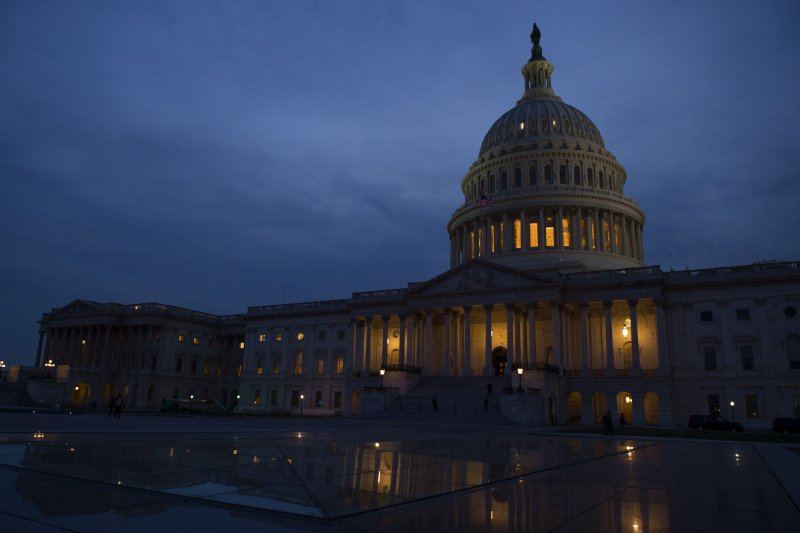Lawmakers in the U.S. Congress must grant an exemption to a 70-year-old federal law in order for retired USMC Gen. James Mattis to become President-elect Donald Trump's secretary of defense. Retired since 2013, Mattis does not qualify for the Pentagon post because the National Security Act of 1947 says any defense secretary must be removed from active military service by at least seven years -- to ensure civilian control of the U.S. armed forces. Photo by Molly Riley/UPI |
License Photo
WASHINGTON, Dec. 2 (UPI) -- All of President-elect Donald Trump's Cabinet appointments need approval from the U.S. Senate, but his defense secretary-in-waiting will have to do even better than that.
Retired Marine Corps. Gen. James Mattis was formally announced as Trump's Pentagon chief on Friday, filling one of the most high profile American Cabinet posts. But before he can move into the office, Mattis will need a bit more than a routine thumbs-up from the Senate Committee on Armed Services.
He needs Congress to pass a new law.
For 70 years, the federal government has said any secretary of defense -- the top official of the United States military -- must be a civilian executive. In other words, they cannot be in active service -- nor can they have served in an active duty role for a minimum of seven years.
After James Forrestal became the first U.S. defense secretary, Congress created the mandate with the National Security Act of 1947 -- believing civilian leadership in the Pentagon ensures the fewest question marks for military policy, which has the potential to be unpopular with active duty members of the armed forces.
Retired from active service just three years ago, Mattis is technically barred by the law from serving as Trump's secretary of defense.
To assume the office, the 47-year USMC veteran needs Congress to give him the same kind of pass it gave to active U.S. Army Gen. George C. Marshall when he took the post in 1950 -- the only time lawmakers have ever done so.
Although the Senate is controlled by Republicans, an exemption is far from guaranteed. Many Republicans have said they will grant a waiver, but several Democratic lawmakers aren't convinced.
Retired USMC Gen. James Mattis, appointed by President-elect Donald Trump as secretary of defense, listens to opening statements at a Senate Armed Services Committee hearing in 2010. Mattis must receive a special waiver from Congress to assume the Pentagon post since he retired from active service only three years ago. File Photo by Alexis C. Glenn/UPI
"While I deeply respect Gen. Mattis' service, I will oppose a waiver," Sen. Kirsten Gillibrand, D-N.Y., ranking member on the Senate Armed Services subcommittee, said on Twitter Friday. "Civilian control of our military is a fundamental principle of American democracy, and I will not vote for an exception to this rule."
"Civilian control of the military is not something to be casually cast aside," Rep. Adam Smith, D-Wash., who's criticized some of Trump's administration appointments so far, added. "While I like and respect Gen. Mattis a great deal, the House of Representatives would have to perform a full review, including hearings by the Armed Services Committee, if it were to consider overriding the statutory prohibition on recent military officers serving as the secretary of Defense."
Republicans, though, view the situation a bit differently.
"I am pleased that the President-elect has selected General James Mattis to be his nominee for Secretary of Defense. As Chairman of the Senate Armed Services Committee, I look forward to moving forward with the confirmation process as soon as possible in the new Congress," Sen. John McCain, R-Ariz., a Navy veteran, said in a statement. "He is without a doubt one of the finest military officers of his generation and an extraordinary leader. ... America will be fortunate to have General Mattis in its service once again."
Gillibrand could require 60 "yea" votes in the Senate to grant Mattis a waiver -- meaning eight Democrats would have to be on board with the notion.
The original ban in the 1947 law was for 10 years, but was cut to seven in 2008.
Trump praised Mattis during a "thank you" rally in Cincinnati on Thursday.
"This campaign proved that the old rules no longer apply, that anything we want for our country is now possible," the president-elect said.
















